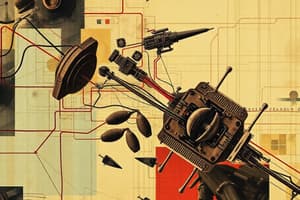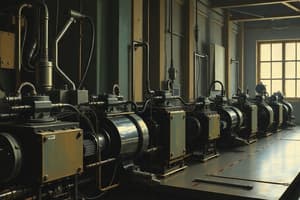Podcast
Questions and Answers
What is the primary function of electromechanical systems?
What is the primary function of electromechanical systems?
- To control the flow of electrical energy
- To increase the efficiency of electrical components
- To convert mechanical energy into electrical energy
- To combine electrical and mechanical components to achieve a specific function or task (correct)
Which of the following is an example of an electrical component?
Which of the following is an example of an electrical component?
- Conductors (wires, cables) (correct)
- Levers and linkages
- Gears and bearings
- Cams and followers
What is the primary function of an electric motor?
What is the primary function of an electric motor?
- To control the flow of electrical energy
- To increase the efficiency of mechanical components
- To convert electrical energy into mechanical energy (correct)
- To convert mechanical energy into electrical energy
Which of the following is an advantage of electromechanical systems?
Which of the following is an advantage of electromechanical systems?
What is the primary function of a relay?
What is the primary function of a relay?
Which of the following is an application of electromechanical systems?
Which of the following is an application of electromechanical systems?
Flashcards
Electromechanical Systems
Electromechanical Systems
Combine electrical and mechanical parts to perform tasks.
Conductors
Conductors
Materials that allow electricity to flow easily, like wires.
Electric Motor
Electric Motor
Converts electrical energy into mechanical motion.
Compact Design Advantage
Compact Design Advantage
Signup and view all the flashcards
Relay Function
Relay Function
Signup and view all the flashcards
Industrial Automation
Industrial Automation
Signup and view all the flashcards
Study Notes
Electromechanical Systems
- Combine electrical and mechanical components to achieve a specific function or task
- Involve the interaction of electrical and mechanical energies
- Examples:
- Electric motors and generators
- Relays and switches
- Solenoids and actuators
- Transformers and inductors
Key Components
- Electrical components:
- Conductors (wires, cables)
- Insulators (plastics, ceramics)
- Semiconductors (transistors, diodes)
- Electromagnetic devices (coils, magnets)
- Mechanical components:
- Gears and bearings
- Levers and linkages
- Shafts and axles
- Cams and followers
Electromechanical Devices
- Electric motors:
- Convert electrical energy into mechanical energy
- Types: DC, AC, stepper, servo
- Generators:
- Convert mechanical energy into electrical energy
- Types: DC, AC, alternators
- Relays and switches:
- Control the flow of electrical energy
- Types: electromechanical, solid-state, reed
- Solenoids and actuators:
- Convert electrical energy into mechanical energy
- Types: linear, rotary, pneumatic
Applications
- Industrial automation
- Robotics and mechatronics
- Aerospace and defense
- Medical devices and equipment
- Consumer products (e.g. appliances, tools)
Advantages
- Increased precision and accuracy
- Improved efficiency and reliability
- Enhanced safety and control
- Compact and lightweight designs
- Versatility and flexibility in design and application
Studying That Suits You
Use AI to generate personalized quizzes and flashcards to suit your learning preferences.




